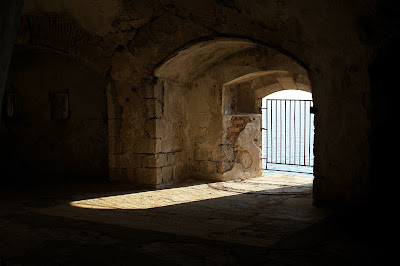De-Fortification: Healing History
 |
 |
| Elmina Fort, Ghana. Photo by Peace Itimi via Unsplash |
Years later (now along with my future-husband I picked up in Amsterdam), I found myself in Africa again, this time we were on the east and south on a 3 country-trip via truck through Rwanda, Uganda, and Kenya. At the Kigali Genocide Memorial in Rwanda, we experienced a different feeling - the only commonality with the Cape Coast was a similar museum-style custodianship out of death. But this was so quite different. The ghosts and the dead here intermingled with the sensation of a peoples and country who had lived out a recent history of trauma and shame – and through this shared grief has come to a radical acceptance. A wide-open reminder of man’s capacity for evil but interwoven with the threads of deep forgiveness as a way out and forward. Cape Coast and Elmina Castles were forts that stunk of imperial harm. Kigali’s memorial displayed a different way to come out of something that seems impossible to overcome (the deaths of half a million or more lives only three decades ago). Rwanda’s was not an imperial fight for some sovereign empire, but it was an ethnic one - birthed after slaughter in a bloody civil war and before that with long roots back to clans jostling for power after years of German and Belgian colonial rule.
In Amsterdam too, we lived right round the canal corner of AnneFrank’s House - another Museum showing the horrors of being the wrong side of a
war, of another genocide. I’m also reminded of a few
school History visits to the battlefields and cemeteries of Ypres. What always
hit me hardest was not the Allies graves with their crisp white crosses but the
dark marble grey minimalist German graveyard, Langemark. Nearly 50,000 soldiers
from 1915 are buried here in Flanders. Legend has it that the German infantry
sang the first stanza of what later became national anthem "Deutschland,
Deutschland über alles" as they charged. The dead everywhere under foot -
another reminder of imperial senseless ‘sacrifice’ for land and empire.
I’ve lived weirdly in many a fort-city and fort-nation, carved out of colonial histories. When I lived in Gibraltar we often travelled across the Straits – via Tarifa in Spain – to Tangiers and through Morocco. I remember driving all through the country from the snowy Atlas Mountains to the souks of Marrakech to the quiet coasts of Essaouira and sleepy beautiful blue hill villages of Chefchaouen back down to grimy Casablanca and Fez. Here too I recall in the coastal fishing towns, once could sense the (this time French) colonial past washing upon the shore like a sea of history in laps of the tide.
On the “Rock” of Gibraltar, another once fortified military strategic trade hub, war and a colonial past are like ghosts of empire looking out across the straits to Africa. A garrison ceded to the British by Spain along with the ‘asiento’ arrangement at the same time – which guaranteed a few decades of British exclusivity to the non-Spanish slave trade to Spanish Americas. Fun fact: In 1817-1819, a thousand African-born soldiers from a West Indies regiment (who originally came to the West Indies on slave ships) formed 25% of the British military protecting the garrison in Gibraltar.
I come from that colonial past – a British expat now living
in Singapore straits, having spent half her life outside her ‘mother country’
offshore and overseas, a ‘foreigner’ – my grandfather being a Major in the
British Army before partition in India. My father spent his early childhood in
the cool hills of Shimla (or Simla as they called it). My grandpa was a paid
officer not a society family, he didn’t hang out with Viceroys and Raj – but dad
grew up with a bearer, a cook, ‘servants’ and wild jaguars paying nightly garden
visits to steal their pet dogs. Vestiges perhaps of a colonial past, an Empire
upon collapse, ghosts of a future yet to come and the end of British ‘rule’. At
partition they returned to the sleepy parochial dull Kent suburbs and a council
house – it must have been quite a change.
So, I grew up on wonderous stories. Stories of adventure, of
a naval life, a mariner’s quest, exotic places beyond the drab English Channel
seas of Sussex villages (although I grew up in shadow of a castle - one that just had its artefacts robbed). I grew up on tales of exploration, navigation, ports, harbours,
sea towns, lush green mountain hill town retreats, oases of British calm across
the Globe as light respite from hot humid tropical Asian outposts, trade, and
travel ‘abroad’.
And here I sit, blogging in 2021 in my highrise condo apartment
in a very contemporary modern Singapore, looking out over the sea - my whole life reflects my Neptune in Sagittarius. A city state full of dazzling skyscrapers
and ingenious technology within a Garden City. A country that has reinvented
itself from its own invented mythology of the Merlion, to it’s powerful
pragmatic ‘founding father’ and a bustling economy in finance, biotech – a smart
nation. And yet, as you pass Raffles Hotel and Mountbatten Road, clues to a
leftover colonial legacy remain on the streets. I’ve learnt that Raffles
himself, the lieutenant here at time of British ‘rule’, was a character who
loved Theosophy and despised old world illicit trades condoned by other
representatives of Empire (namely opium, gambling and the slave trade). He was
aghast at his subordinate Farquhar’s
tolerance (perhaps even encouragement?) of such things, especially slavery
(girls from Indonesia). The more I read about Raffles the more I like, despite
his ‘imperial baggage’ – he sure isn’t a woke figure, but his deep complexities intrigue me. The bicentennial a few years back certainly raised debate over here - Pirate or Hero, what do you think?
For Raffles though, its the Theosophy as you may have guessed that resonated with me. I plan to read up on that more. How a man (whose wife died in his stint as Governor in Indonesia and who himself died in his mid-forties) so entwined in all things military, colonialism and Empire could have reconciled this with his spiritual and philosophical beliefs? But as I read through this, I realise too that is true of me.
How does
Dame Fortuna draw her lot? How do we get the hand we are dealt, the cards
assigned to us? How does destiny choose one over the other? Why do we
reincarnate into one point and place in the timeline and not into the other? Why
was she taken from some Ashanti kingdom and slung left to die on a slave ship
to build a ‘New World’ with her sweat and blood? Why was that young solder fighting
in muddy fields of Belgium? Why was that country ruled by France, that one by Britain,
that by the Dutch or the Belgian, the Spanish, Portuguese, or German? Who
judges – who decides fate? Why does our sponsored girl in Ethiopia possibly
have less opportunity that our son in Singapore? Why did one grandfather serve
in India and another on the buses? Why did one lose a military career at the partition of a subcontinent and the other lose his whole family in a bomb shelter in
the Blitz?
Philip K Dick in his later mad years (or not?) rants on ‘the black iron prison’ – that reality is a trap, that everything we know is a lie. History is written by the winners. And the Empire (despite Rome’s fall) never died. What if time is not linear, there is no progress or growth to a great big shiny tomorrow, but rather (as I suspect) all is cyclical and time is deep? Everything is temporal, or not. Do we all dwell in this Deep Time space, where the odds are set at the start, where we are enslaved in a map of reality that is stacked against us?
Yet still as souls at the departure gates (from where I know not)
we choose to embark upon this voyage of Earthly discovery, despite knowing all
the odds, we take the Human trip and exit the gangway to emerge into this life’s
existence. We take the tour; we travel to our Self. Is it a one-way ticket –
who knows? But we choose (at least, I choose to believe it is a choice) this
path – we elect to dwell and make habitat here on this planet in this form. Our
spirit becomes tourist of a package-trip of miracles. Did our ancestral forms
(angels perhaps?) choose the way of the slave, the path of the indentured, the
prisoner, the war soldier, the colonial general, the massacred, the besieged townsman
or even the Emperor/ Empress card his/herself? Did we come here, did we arrive,
as energy beings, to learn something or to teach something or just to experience
the ‘other’? Did we know this is what we’d get as characters in some great cosmic
epic narrative?
And where after our point in history ends, where will we go next? What have we learnt this time around the sun about the horrors of colonialism, war, killing, Anthropocene ecological crime? Have we learnt enough as a species not to be taken out by a little virus? In every landgrab through history, don’t the colonists always succumb to some disease, some plague, some infectious spread? Will we be refugees of Gaia’s fury? Or will we stand emancipated, liberated, migrants of the future yet to come – keeping our settlement camps warm and illuminated by night fires of burning wood, ripped down from old forts?
It seems fitting to be musing on these matters at time of the Saturn retrograde and in the week of the first eclipse of 2021 (in Sag!) directly prior to the Mercury retrograde end of the week. Nodes, eclipses, a change in light and dark, ascension and descension. Time to release and let go, time to build our sanctuary and shed expectations. The snake's head and tail are activated. Fate is here, but we have a say - via our idealism - in the direction. This is how we heal through what is revealed.
Whatever the Future, its decided (whether pre-written
or adlibbed) in the Now. Our collective healing is written in our response to Past history and in our detachment from the outcome, in our defortication.
 | ||
| Cape Coast. Photo by Badal Patel on Unsplash |


Comments
Post a Comment